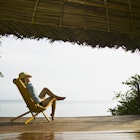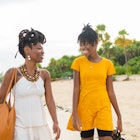
Oct 31, 2024 • 11 min read

Nov 16, 2021 • 6 min read

Entry requirements for travelers to the Dominican Republic remain straight forward © Filippo Carlot / Getty Images/iStockphoto
The pandemic hasn’t been easy for the precarious profession of travel writing. But as the world slowly loosens its shackles after 20 months of canceled contracts and frustrating false-starts, I’ve made it my job as Lonely Planet writer to get back on the road in search of spontaneity, inspiration and a good story. My latest stop: the Dominican Republic.
My choice of destination wasn’t all chance and serendipity. Throughout the course of the pandemic the Dominican Republic (DR), along with Mexico, has been one of least restrictive nations in the world for travelers to enter and exit. However, unlike Mexico where total deaths are edging toward 300,000, the Dominican Republic has navigated the vicissitudes of COVID-19 relatively smoothly. Entry requirements are relatively straightforward, in-country rules sensible without being over-zealous and, at the time of travel, active cases were low. However, as we know by now the coronavirus situation can change very quickly, and the Pan-American Health Organization (PAHO) announced that new COVID-19 cases in the Dominican Republic has increased by over 40% in recent weeks.

As a travel writer, the Dominican Republic tempted me with plenty of things to write about. In the lead up to the COP26 climate summit in Glasgow, I was looking for interesting eco-projects to lure travelers out of the mega-resorts. Fortuitously, the north coast of the possessed a slew of innovative ventures. But first I had more prosaic matters to deal with.
If there’s one thing I’ve learned about travel in the time of coronavirus, it’s check, double-check, and check again. Rules change frequently, cases can surge and nuances differ from country to country. Back in the good old days, all you needed to go on holiday was a passport and a boarding pass. In 2021, rule-weary travelers must decipher complex paperwork, expensive COVID tests, and long-winded travel apps to allow them to get home.
Employing an attention to detail that’s second nature to a guidebook writer, I prepped for my DR trip from my home in Canada by phoning the Dominican Embassy in Ottawa, the Dominican tourist board in Toronto, and the perennially overwhelmed offices of Air Canada to ensure I hadn’t missed any hidden pitfalls.

With no pre-trip COVID test necessary for residents of Canada, the paperwork ultimately came down to just two forms: a copy of a Dominican eticket (available online) to get me through customs in the DR, and printed proof that I had been fully vaccinated to show to my Canadian airline before boarding the plane.
Then there was the small matter of insurance. Some holiday companies include special COVID insurance in their packages. However, as I was traveling independently, I paid C$40 for ‘trip interruption’ on top of my personal policy in case I had to quarantine in the destination.
Having flown in the early days of the pandemic on planes that were three-quarters empty, I was surprised to find that both my Vancouver-Montreal and Montreal-Puerto Plata flights were almost full. But with the government of Canada mandating that all air passengers be masked and fully vaccinated, I shrugged off any lingering paranoia as our Airbus 321 cruised smoothly above the US eastern seaboard before descending into Gregorio Luperón International Airport on the DR’s north coast. Dominican customs was a formality. With my passport stamped and bags scanned, I dashed eagerly into the arrivals hall where cheering airport staff danced dexterously to a merengue backbeat. After nearly two years with practically no tourists, they were obviously pleased to see us.
I’d organized a taxi for the 20-minute ride to my pre-booked accommodation at the Tubagua Eco-lodge, a rustic collection of chalets and huts perched on the cusp of the Septentrional Mountains.

Built out of palm thatch and local wood in the style of an indigenous village, the lodge is renowned for its spectacular home-cooked food and equally spectacular views. With just eight simple rooms that utilize mountain breezes rather than air-con, masks were barely necessary, especially as there were only two other guests: a Swiss couple touring the country in a rental car.
Lodge owner, Tim Hall generously hooked me up with a local guide called Juanín who ferried me around a network of nascent community tourism projects on the back of his motorbike. Riding pillion like Jack Nicholson in Easy Rider along the undulating Ruta Panorámica, I dropped into a rehabilitated coffee plantation, a tiny shovel-and-pick amber mine, and a dusty roadside workshop where an ingenious Dominican señor was turning old car tires into artistic flower baskets.

After Tubagua I gravitated toward the coast where I’d reserved cheap lodgings in the easygoing kite-surfing mecca of Cabarete. Staying in the proximity of a town for the first time meant I had to keep my mask closer to hand.
In the DR, face-masks are mandatory in shops and public buildings. However, as life in the Caribbean is lived mostly outside, regulations aren’t always religiously enforced. On one occasion I was asked to show my proof of vaccination to enter a bank but, more commonly, I was allowed to sit in semi-deserted alfresco restaurants where the nearest customer sat several tables away.

I spent my final four days visiting an innovative aquaponics farm, exploring Cabarete’s abundant network of caves, and watching masterful kite-surfers fly gracefully over white-capped waves. While tourists are trickling back to the DR post-Covid, there’s no deluge as yet. Crowds remain thin and the resulting tranquility is therapeutic.
One of the nagging irritations of pandemic travel is the way stringent re-entry regulations eat into your vacation time. Some countries only require easy-to-procure rapid antigen tests to get home but, as a resident of Canada, I had to cough up for a slower, more expensive PCR test. As I wasn’t staying in a resort (which often organize tests onsite), I had to sort out the logistics myself.

Keen to lighten the bureaucracy for tourists, the Dominican Republic has made COVID testing relatively easy. The nearest clinic to my Cabarete lodging was 10km away in Sosúa and offered tests for US$72 with results back in 24 hours. The only caveat—I had to return to the clinic the following day to pick them up.

It wasn’t as bad as it sounded. Though with less to offer than Cabarete, Sosúa has a lovely beach and an interesting history: it was founded by Jewish refugees on the run from the Nazis in 1940. A small museum and synagogue testify their fascinating story.
The Dominican Republic proved to be the most easygoing and bureaucracy-free of the five countries I’ve visited since the world reopened. Flying out of Gregorio Luperón airport the next day, I arrived carrying an armful of admin: negative PCR test, proof of vaccination certificate, DR exit eticket, ArriveCAN app (required to get back into Canada), passport, boarding pass and Canadian residence card. Notwithstanding, after navigating an obstacle course of security checks and a chorus of cheery hasta luegos, I found myself sitting in the departure lounge nursing a Bohemia beer and reflecting fondly on a constructive trip.
You might also like:
Caribbean destinations this winter: a guide to finding your idea of paradise
Top 17 beaches in the Caribbean
These 5 islands are the Caribbean's best-kept secret&


Oct 31, 2024 • 11 min read



Jun 20, 2024 • 7 min read

Dec 11, 2023 • 5 min read


Jul 14, 2023 • 5 min read

Jun 27, 2023 • 3 min read
